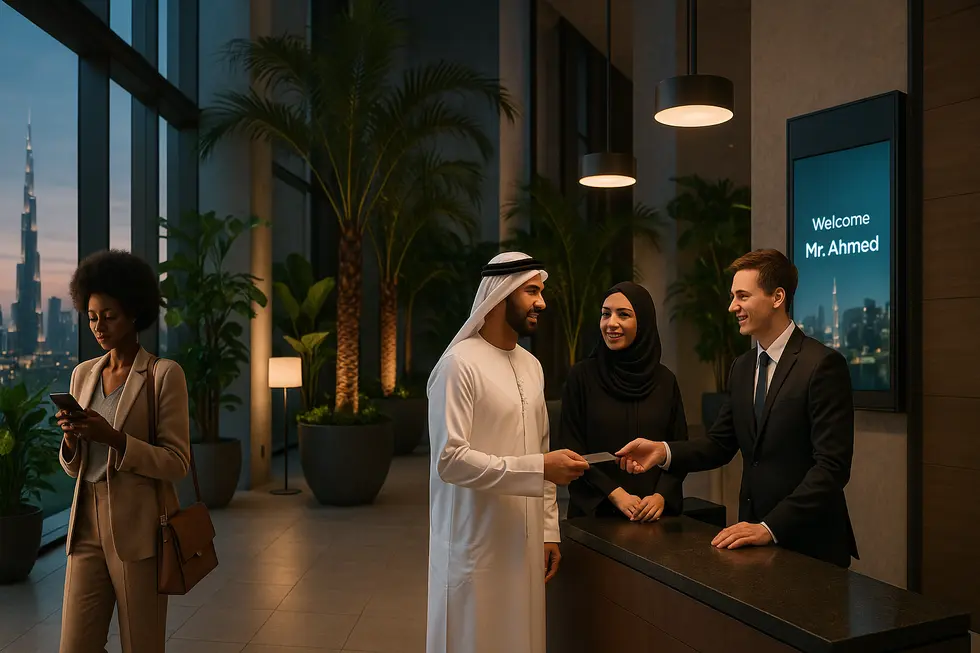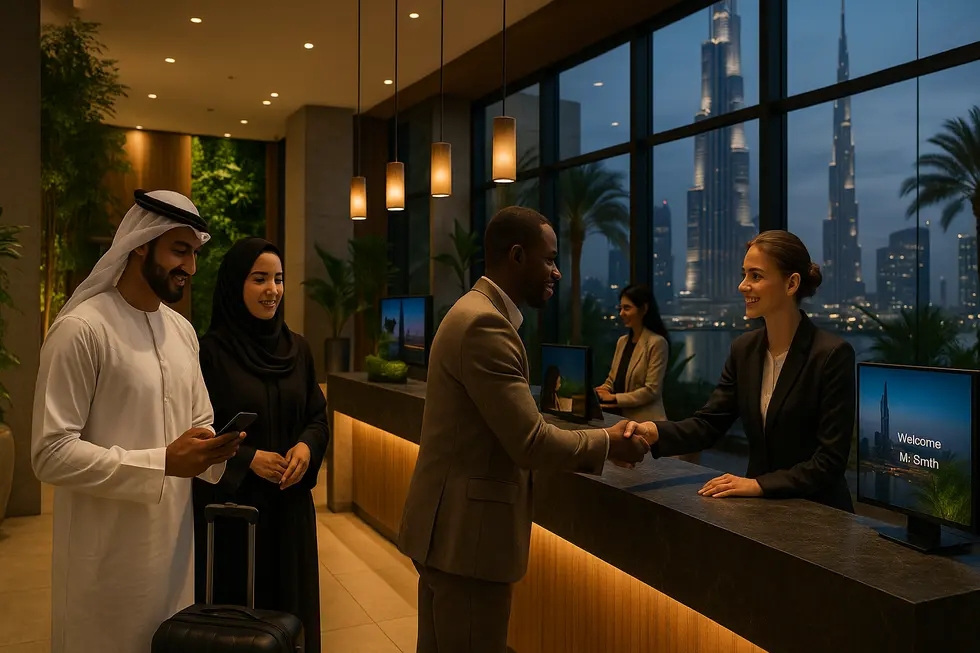Why Dubai Hotels Must Rethink Guest Journeys: Strategy Over Surface-Level Service
Dubai hotels must rethink guest journeys by adopting tech-driven personalization, sustainability, and cultural sensitivity to increase loyalty.
Customer Loyalty & Guest Experience
Why Dubai Hotels Must Rethink Guest Journeys: Strategy Over Surface-Level Service — Technology-Driven Personalization and Data Enablement

1. Wiring Personalized Journeys: Building a Privacy-First, AI-Enabled Tech Core
A unified, privacy-first technology foundation turns amenities into meaningful journeys. Core systems—PMS, CRM, CRS, RMS, POS, building management and mobile apps—must connect through middleware and APIs to form a real-time guest profile. A hybrid edge-and-cloud model keeps in-room actions responsive while scaling analytics centrally. Consolidate transactional records, behavioural signals, IoT telemetry and guest-supplied preferences as first-party data, and enrich with consented third-party inputs for accuracy.
AI drives personalized offers, dynamic room settings, natural-language concierges and predictive maintenance. Models must include contextual features like seasonality and local events, and be validated to prevent drift and bias. An event-driven orchestration layer triggers pre-arrival touches, in-stay suggestions and back-of-house workflows.
Governance and security are non-negotiable: PDPL and GDPR-aligned mapping, consent UIs, encryption, role-based access, zero-trust, pen tests and supply-chain risk controls. Finally, tech must augment staff via mobile dashboards and targeted training in tech and cultural competency to deliver emotional, not robotic, personalization. For practical strategy guidance see our piece on guest experience strategy in Dubai.
External reference: https://www.restauranttimes.com/blogs/trending/dubai-hospitality-industry-trends/
2. From Data to Dollars: Economic and Operational Imperatives for Strategy-Led Personalization
From Data to Dollars: Strategy-led personalization converts guest insight into measurable financial outcomes. By linking CRM, CRS and RMS data, hotels increase ADR and RevPAR through targeted offers, upsells and event-driven segmentation while boosting ancillary spend in F&B, spa and curated experiences. Predictive maintenance and smart-room controls cut CAPEX and OPEX by reducing failures and energy draw; automation of routine tasks lowers labor cost and reallocates staff to high-impact, revenue-generating moments. Personalization enables micro-segmentation—business versus leisure, cultural or family needs—so upscale and mid-tier properties can deliver bespoke value at scale and reduce OTA dependency via direct-booking incentives and pre-stay engagement (see guest experience strategy in Dubai). Operational redesign requires updated SOPs, real-time dashboards, incident workflows and predictive rostering. Track ROI with incremental revenue per personalized interaction, conversion uplift, NPS/CSAT, repeat-rate and operational KPIs like time-to-respond and energy per occupied room. The outcome: clear revenue upside, measurable cost savings and stronger market positioning. For broader market context see https://www.restauranttimes.com/blogs/trending/dubai-hospitality-industry-trends/
3. Cultural Intelligence and Compliance: Designing Data-Driven Guest Journeys in Dubai
Cultural intelligence and geopolitical awareness are central to redesigning guest journeys in Dubai. Visitors from over 180 countries bring diverse dietary laws, prayer rhythms, Ramadan practices, gender norms, and language needs. Personalization should use cultural templates while preserving guest agency. Let guests control preferences to avoid stereotyping and protect dignity. Legal frameworks such as the UAE PDPL and GDPR shape how hotels collect and use data. Tech stacks must embed privacy by design and consent workflows. Geopolitical shifts alter source markets and traveler risk perceptions. Hotels must pivot offers toward growing regions, including GCC, South Asia and Sub-Saharan Africa. Data-driven personalization also powers sustainability. Energy-optimized room settings and targeted linen programs reduce footprint and support ESG reporting. Authentic personalization builds social license and defends online reputation. Integration with city platforms—digital IDs, visa facilitation and mobility—boosts convenience. Ensure equity with multi-channel access: mobile, kiosk and human service. For practical guidance see guest experience strategy in Dubai. External source: https://www.restauranttimes.com/blogs/trending/dubai-hospitality-industry-trends/
Technological Enablement and Personalization: Sustainable, Efficient Guest Journeys for Dubai Hotels

1. From Contactless to Curated: Technology-Driven Personalization that Reduces Cost and Builds Loyalty
Technology must do more than automate; it must enable purposeful personalization that supports sustainability and cost control. When biometric and contactless touchpoints reduce friction, staff are freed to deliver meaningful interactions. AI-driven guest profiles convert preferences into tailored room settings, curated menus, and culturally sensitive services. Those micro-personalizations lift ancillary spend and repeat visits while improving energy efficiency through smart-room controls. Unified operational platforms link predictive maintenance, housekeeping, and procurement to reduce downtime and waste, lowering operating costs without degrading experience. This convergence of tech and strategy also sharpens segmentation and direct-channel messaging, improving conversion and reducing commission spend. Embedding cultural cues and sensory design into data-led journeys creates emotional loyalty that justifies premium pricing. For hotels planning change, start with measurable pilots: personalize top revenue drivers, monitor energy per occupied room, and track incremental revenue per interaction. For practical guidance on designing these journeys, consult a focused guest experience playbook like the one on guest experience strategy in Dubai.
External resource: https://www.markus-mensch.ae/blog/dubai-hotels-restaurant-guest-experience-8afbd
2. Operational Backbone: Integrating Sustainability and Cost Control into the Guest Journey
Operational Backbone: Integrating Sustainability and Cost Control into the Guest Journey
Embedding sustainability into daily operations moves hotels beyond token gestures. Dubai’s DST recognition shows measurable practices matter; energy, water, waste and procurement must be engineered into facility systems and workflows. When building management systems, IoT, procurement platforms and housekeeping schedules are integrated, resource use drops and predictable savings emerge. That integration frees staff from repetitive tasks and redirects human effort to culturally attuned, high-value guest moments. Centralized data on consumption and guest preferences lets revenue and operations teams tune pricing, maintenance and F&B supply to reduce waste and cost. Resilient supply chains and preventive maintenance limit downtime and protect margins during demand swings. Operational design should balance automation with staff discretion so personalization retains dignity and cultural sensitivity. For a practical bridge between guest strategy and operations, see the guest experience strategy resource: guest experience strategy - Dubai. External reference: https://mediaoffice.ae/en/news/2025/february/26-02/dubai-department-of-economy-and-tourism-recognises-153-hotels-with-dubai-sustainable--tourism-stamp
3. Sustainability and Societal Context: Designing Culturally Resonant, Cost-Savvy Guest Journeys
Dubai hotels must align environmental stewardship, cost control and cultural nuance into a single guest journey. Embedding sustainability into procurement, energy and waste workflows reduces costs and signals credibility to discerning guests. When smart-room controls cut energy use, staff can focus on curated, sensory moments that create emotional loyalty. Cultural resonance amplifies this effect: bespoke aromas, local cuisine collaborations and private-service protocols respect diverse norms while elevating perceived value. Operational redesign—updated SOPs, predictive staffing and partner SLAs—turns strategy into repeatable service without adding headcount. Data links these layers: preference profiles drive targeted offers, improve RevPAR and reduce OTA dependency through direct-booking incentives. Societal and geopolitical shifts frame risk and opportunity; aligning with global sustainability goals and local community initiatives strengthens social license to operate and buffers demand shocks. The payoff is measurable: lower energy per occupied room, higher ancillary spend, and improved retention. For practical frameworks on embedding sustainability and social alignment, see the research summary below.
https://www.grin.com/document/1504071?lang=en
For practical transformation tactics, review the guest experience strategy in Dubai.
Cultural Sensitivity as Strategy: Transforming Guest Journeys in Dubai Hotels

1. From Polite Gestures to Purposeful Design: Embedding Cultural Sensitivity Across Guest Journeys
Cultural sensitivity must move from decorative touches to a deliberate design principle that shapes every guest interaction. In Dubai’s multicultural market, hotels succeed when leadership embeds inclusivity into policies, staffing and experience design. That means training teams on privacy norms, religious observances and family priorities, and translating those insights into tailored offers, room setups and F&B options. Sensory programming—curated scents, regionally informed soundtracks and menus—creates emotional resonance rooted in local and guest cultures. Loyalty programs should respect privacy and status cues while rewarding meaningful behaviours that reflect regional values. Authentic differentiation comes from storytelling and partnerships that elevate Emirati heritage through craft, cuisine and curated excursions, rather than token displays. Operationally, culturally informed SOPs and frontline empowerment deliver consistent service without stereotyping. For practical frameworks and examples, see the analysis of Dubai hotel guest experience approaches in Dubai hotels restaurant guest experience. External reference: https://www.markus-mensch.ae/blog/guest-experience-strategy-dubai
2. From Points to Passion: Building Culturally Attuned Loyalty and Hyper-Personalization
Hotels that win in Dubai engineer loyalty through culturally attuned, sensory-rich personalization rather than transactional perks. Loyalty must shift from points accumulation to emotional currency: tiered, experience-first rewards that respect family norms, privacy, and regional luxury tastes. Multi-sensory cues—signature scents, curated soundtracks, tactile amenities and authentic culinary storytelling—create memory anchors that encourage return visits. Programs should let guests control preferences to avoid stereotyping and protect dignity. Privacy safeguards and flexible benefits build trust across diverse demographics and geopolitical sensitivities. Experience-led loyalty also drives revenue through targeted upsells and simplified operations, when benefits are meaningful and executable. People remain central: staff enabled with guest context deliver the human moments that technology cannot fake. Continuous market listening and adaptive benefit structures keep offers relevant as source markets shift. Smaller hotels can compete by crafting exclusive, culturally fluent experiences rather than by discounting. Practical patterns for F&B-driven loyalty are explored in F&B build guest loyalty. Further industry context: https://www.restauranttimes.com/blogs/trending/dubai-hospitality-industry-trends/
3. Differentiation by Design: Turning Cultural Insight into Operational Advantage
Differentiation by design means embedding cultural insight into every operational decision, not only marketing. By profiling guest archetypes and emotional triggers, hotels craft signature sensory moments—scents, soundtracks, textures and menu narratives—that resonate across cultures. Operational innovation makes those promises reliable: automated pre-arrival preferences feed housekeeping, kitchen and front office systems so teams deliver without friction. Technology reduces routine tasks and frees staff for meaningful human moments. Loyalty shifts from points to preference-driven tiers and exclusive experiences that reflect privacy norms and family priorities. Local partnerships with artisans, transport providers and travel carriers amplify authenticity and distribution reach. Sustainability and culturally aligned storytelling convert values into willingness to pay. Measure outcomes with interaction-level revenue, repeat rates and operational KPIs to prove ROI. This integrated approach enables mid-tier and upscale hotels to compete with traditional luxury by delivering bespoke experiences at scale. For practical operational tactics, see the guest experience strategy in Dubai. https://campaignme.com/reinventing-hospitality-marketing/
Final thoughts
Dubai's hospitality market rewards strategy over spectacle. By combining technology-driven personalization, measurable sustainability practices, operational efficiency, and culturally intelligent loyalty, 4-star hotels can convert one-off visitors into repeat guests and protect margin in a crowded market. The shift from surface-level service to engineered guest journeys requires aligned data, trained teams, and a clear roadmap that links guest emotion to commercial outcomes. Execute iteratively, measure impact, and prioritize interventions that free your people to deliver moments that matter. Let’s design a guest journey they’ll never forget – start the conversation now.
About us
Markus Mensch is a strategic marketing consultancy specializing in hospitality and F&B brands, with offices in Dubai and Germany. Since 2007, the company has supported over 1,000 businesses in increasing visibility, guest loyalty, and revenue without relying on paid ads. With the proprietary OBC-Strategie®, Markus Mensch and his team provide structured, result-oriented solutions tailored to 4-star hotels and restaurants. The company combines marketing expertise, industry experience, and hands-on implementation to help clients achieve sustainable growth. Made in Germany — Built for Dubai.
Transform Your Hospitality Business Today
Are you ready to boost your revenue and enhance guest loyalty? Let's get started!

